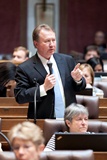
State Budget Update
May 20, 2015
|
Contact Me |

State Capitol
P.O. Box 8953
Madison, WI 53708
PH: (608) 266-0631
TF: (888) 534-0094
FAX: (608) 282-3694
District/Law Office
1230 Ferry Street
La Crosse, WI 54601
(608) 785-1886
rep.doyle@legis.wi.gov
On the Web:
http://doyle.assembly.wi.gov
|
In The District |
In The
Legislature
***
Assembly Committee on Financial Institutions - Ranking Member
Assembly Committee on Insurance
- Ranking Member
Assembly Committee on
Small Business Development
Joint Review Committee on
Criminal Penalties

Some of you may be wondering why I didn’t send out a budget update yesterday. Well, that is because the Joint Finance Committee (JFC) debated budget motions until 1:30 am last night. It didn’t help that instead of starting at their usual 10 am, the JFC didn’t actually begin until 2 pm. They dealt with some of the most controversial issues included in the budget, focusing on education. So this budget update is going to focus on education as well. Fair warning, it might get a little technical but this is such an important issue so I want to go into more detail than usual.

Late last night on a strict party-line vote, the JFC approved their
“K-12 education omnibus motion,” essentially, one giant motion (or
amendment) 29 pages long which included all their proposed changes to
education. This is very different from the normal proceedings where the
JFC takes up a larger matter (K-12 education) by dividing each issue
(voucher funding, teacher licensing) into a separate motion. What is
also different is that the funding for all of these changes would come
from a $105.6 million payment to public schools in July of 2017. It
won’t be counted as part of this year’s budget but rather the next one.
It is also worth pointing out the every budget covers a biennium – a two
year span. The budget we are working on right now is for 2015 through
2017, and the budget that is now ending was for 2013 through 2015.
Sometimes you will see funding divided by year, 2015-16 or 2016-17. The
new budget always takes effect on July 1st.
Funding
-
The Governor proposed to cut $127 million to public schools during the 2015-16 school year.
-
The JFC maintained these cuts but added $70 million in funding to the 2016-17 school year. This money comes from a $250 per student funding method.
-
School districts will be able to count voucher students in their enrollment numbers to determine their amount of state funding from the JFC plan.
Voucher Cap
-
The Governor proposed to lift the 1,000 student cap on the statewide voucher program.
-
The JFC voted to lift the cap and create a separate voucher program for students with disabilities. However, the JFC voted that no more than 1% of a school district’s total enrollment could receive vouchers.
Voucher Payments
-
The JFC plan calls for private schools receiving vouchers to get roughly $7,200 for each K-8 student and $7,800 for each high school student. (This compares to $6635 per student that would go to a public school).
-
The Governor’s plan called for less per student.
-
Vouchers for new students would be paid from school district’s funding.
-
The voucher program expansion will be funded in a similar way to the open enrollment program, which is the money would follow the student from their public school to the private voucher school.
-
According to the non-partisan Legislative Fiscal Bureau (LFB), this would cost districts up to $48 million over the biennium.

Open Enrollment
-
The JFC proposal would allow a student to attend a public school outside their home school district or even outside of the state. The school district where the child lives would have to pay the student’s tuition.
Common Core

-
The Governor’s budget would prohibit the state superintendent from promoting the Common Core State Standards and adopting academic standards created by the Common Core State Standards Initiative.
-
The JFC approved this provision as part of their motion.
State Testing
-
The JFC plan calls on the State Department of Public Instruction (DPI) to replace the current Smarter Balanced exam and to ask the U.S. Department of Education to waive the requirement that public school students take a state assessment each year.
-
Schools would then have to choose from a selection of five different tests.
School Report Cards

-
The Governor’s budget proposal would give schools a letter grade (A-F) on their state report card.
-
The JFC voted to instead use a 5-star rating system for the report cards.
-
Additionally, the Governor proposed to give independent charter schools and private voucher schools report cards in the next school year.
-
The JFC approved this proposal.
Independent Charter Schools
-
The JFC proposal allows students who attend an independent charter school, virtual charter school or are home schooled play sports or participate in extracurricular activities within the school district where they live.
-
The JFC also vetoed a plan by the Governor to create an independent charter school authorizing board.
Teaching Licenses
-
The JFC motion would allow the DPI to grant teaching licenses to people wanting to teach technical courses and meet the requirements for work experience and teacher training. No bachelor’s degree would be required.
Other education-related issues passed by the JFC would:
-
Allow students to fulfill have of their credits required before high school graduation by “demonstrating competency or creating a learning portfolio.”
-
Prohibit test scores from virtual charter school students from being included in the schools’ host school district if more than 50% of the students don’t actually live in that district.
-
Require students to pass a civics test before graduating high school.
-
Allocate $10,000 to create a digital textbook marketplace.
-
Create a grant program to give school districts and independent charter schools $1,000 per student with disabilities who graduates and then enrolls in college, is “competitively employed” or is enrolled in job training or high school completion programs.
-
Eliminate the Course Options program to allow college courses to be taught in high schools.

In addition to the omnibus motion relating to K-12 education, the JFC
took up several other issues as well:
Drug Testing for Welfare Recipients
-
The Governor’s proposal called for drug testing for all single, able-bodied adults on FoodShare and to ask permission from the federal government to do so.
-
The JFC voted not to ask permission for the federal government. Drug testing would also be used for those on unemployment, BadgerCare Plus or job training through Wisconsin Works W-2.
-
Because this would be done without seeking federal approval, it is expected that this proposal will result in a lawsuit and perhaps financial sanctions from the federal government.
State Employee Benefits
-
The state Group Insurance Board approved a measure to double what state employees could pay out-of-pocket for healthcare. This is expected to save $85 million over the biennium.
-
The plan was originally proposed by the Governor and would increase the out-of-pocket limit from $500 to $1,000 for individuals and from $1,000 to $2,000 for families. The new deductible would be $250 for individuals and $500 for families.
-
However, the JFC voted to require any changes made by the board to be sent to another legislative committee for approval.
-
The JFC also approved a proposal drafted by the Governor to offer $2,000 to state employees who opt out of the state insurance coverage.
Prison Tower Guards
-
The JFC voted to eliminate 60 jobs in the Department of Corrections and to stop staffing prison towers during the overnight shift.
-
However, six of the eleven jobs at Waupun Correctional Institution will not be cut until 2017.
If you have made it this far, you might be wondering what all this means
for Wisconsin. To tell you the truth, we are still trying to figure it
out too. What we do know is that money will be going to our public
schools but the effect will be at least partially offset by the voucher
school expansion. As we learn more, I will include it in future updates.
The JFC will be back again tomorrow to discuss the Department of
Financial Institutions, the Department of Safety and Professional
Services and the Department of Health Services among others. But if last
night was any example, we probably won’t have a budget update until the
next day.
Sincerely,
STEVE DOYLE
State Representative
94th Assembly District
If you would like to have your name removed from this email list, please reply to this message with “Unsubscribe” in the subject line